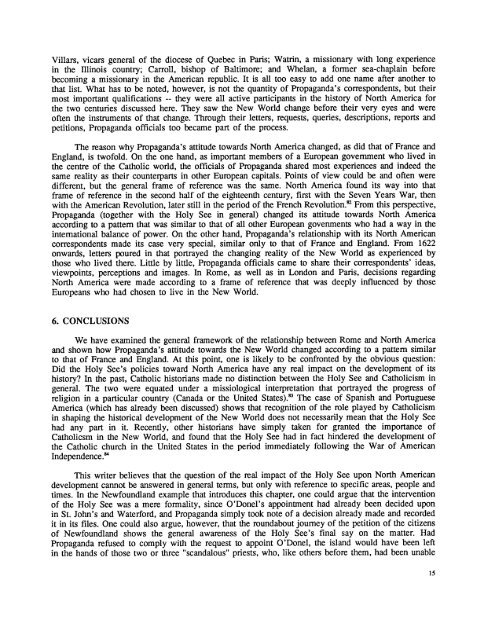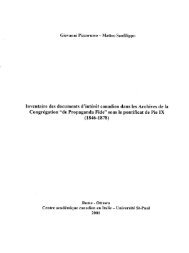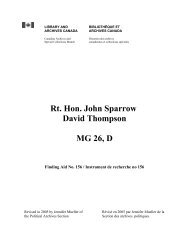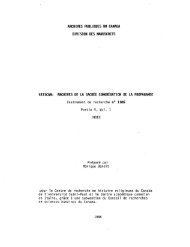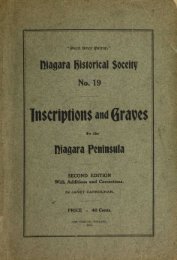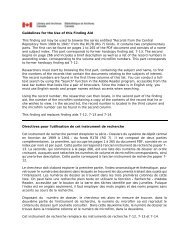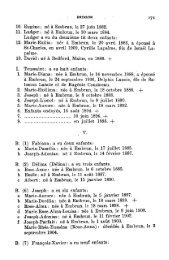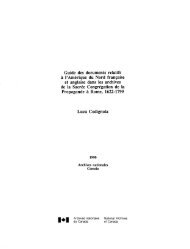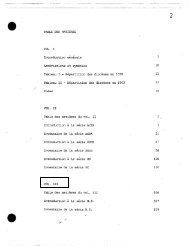Guide to Documents Relating to French and British North America in ...
Guide to Documents Relating to French and British North America in ...
Guide to Documents Relating to French and British North America in ...
Create successful ePaper yourself
Turn your PDF publications into a flip-book with our unique Google optimized e-Paper software.
Villars, vicars general of the diocese of Quebec <strong>in</strong> Paris; Watr<strong>in</strong>, a missionary with long experience<br />
<strong>in</strong> the ill<strong>in</strong>ois country; Carroll, bishop of Baltimore; <strong>and</strong> Whelan, a fonner sea-chapla<strong>in</strong> before<br />
becom<strong>in</strong>g a missionary <strong>in</strong> the <strong>America</strong>n republic. It is all <strong>to</strong>o easy <strong>to</strong> add one name after another <strong>to</strong><br />
that list. What has <strong>to</strong> be noted, however, is not the quantity of Propag<strong>and</strong>a's correspondents, but their<br />
most important qualifications -- they were all active participants <strong>in</strong> the his<strong>to</strong>ry of <strong>North</strong> <strong>America</strong> for<br />
the two centuries discussed here. They saw the New World change before their very eyes <strong>and</strong> were<br />
often the <strong>in</strong>struments of that change. Through their letters, requests, queries, descriptions, reports <strong>and</strong><br />
petitions, Propag<strong>and</strong>a officials <strong>to</strong>o became part of the process.<br />
The reason why Propag<strong>and</strong>a's attitude <strong>to</strong>wards <strong>North</strong> <strong>America</strong> changed, as did that of France <strong>and</strong><br />
Engl<strong>and</strong>, is twofold. On the one h<strong>and</strong>, as important members of a European government who lived <strong>in</strong><br />
the centre of the Catholic world, the officials of Propag<strong>and</strong>a shared most experiences <strong>and</strong> <strong>in</strong>deed the<br />
same reality as their counterparts <strong>in</strong> other European capitals. Po<strong>in</strong>ts of view could be <strong>and</strong> often were<br />
different, but the general frame of reference was the same. <strong>North</strong> <strong>America</strong> found its way <strong>in</strong><strong>to</strong> that<br />
frame of reference <strong>in</strong> the second half of the eighteenth century, first with the Seven Years War, then<br />
with the <strong>America</strong>n Revolution, later still <strong>in</strong> the period of the <strong>French</strong> Revolution. 82 From this perspective,<br />
Propag<strong>and</strong>a (<strong>to</strong>gether with the Holy See <strong>in</strong> general) changed its attitude <strong>to</strong>wards <strong>North</strong> <strong>America</strong><br />
accord<strong>in</strong>g <strong>to</strong> a pattern that was similar <strong>to</strong> that of all other European govenments who had a way <strong>in</strong> the<br />
<strong>in</strong>ternational balance of power. On the other h<strong>and</strong>, Propag<strong>and</strong>a's relationship with its <strong>North</strong> <strong>America</strong>n<br />
correspondents made its case very special, similar only <strong>to</strong> that of France <strong>and</strong> Engl<strong>and</strong>. From 1622<br />
onwards, letters poured <strong>in</strong> that portrayed the chang<strong>in</strong>g reality of the New World as experienced by<br />
those who lived there. Little by little, Propag<strong>and</strong>a officials came <strong>to</strong> share their correspondents' ideas,<br />
viewpo<strong>in</strong>ts, perceptions <strong>and</strong> images. In Rome, as well as <strong>in</strong> London <strong>and</strong> Paris, decisions regard<strong>in</strong>g<br />
<strong>North</strong> <strong>America</strong> were made accord<strong>in</strong>g <strong>to</strong> a frame of reference that was deeply <strong>in</strong>fluenced by those<br />
Europeans who had chosen <strong>to</strong> live <strong>in</strong> the New World.<br />
6. CONCLUSIONS<br />
We have exam<strong>in</strong>ed the general framework of the relationship between Rome <strong>and</strong> <strong>North</strong> <strong>America</strong><br />
<strong>and</strong> shown how Propag<strong>and</strong>a's attitude <strong>to</strong>wards the New World changed accord<strong>in</strong>g <strong>to</strong> a pattern similar<br />
<strong>to</strong> that of France <strong>and</strong> Engl<strong>and</strong>. At this po<strong>in</strong>t, one is likely <strong>to</strong> be confronted by the obvious question:<br />
Did the Holy See's policies <strong>to</strong>ward <strong>North</strong> <strong>America</strong> have any real impact on the development of its<br />
his<strong>to</strong>ry? In the past, Catholic his<strong>to</strong>rians made no dist<strong>in</strong>ction between the Holy See <strong>and</strong> Catholicism <strong>in</strong><br />
general. The two were equated under a missiological <strong>in</strong>terpretation that portrayed the progress of<br />
religion <strong>in</strong> a particular country (Canada or the United States).83The case of Spanish <strong>and</strong> Portuguese<br />
<strong>America</strong> (which has already been discussed) shows that recognition of the role played by Catholicism<br />
<strong>in</strong> shap<strong>in</strong>g the his<strong>to</strong>rical development of the New World does not necessarily mean that the Holy See<br />
had any part <strong>in</strong> it. Recently, other his<strong>to</strong>rians have simply taken for granted the importance of<br />
Catholicsm <strong>in</strong> the New World, <strong>and</strong> found that the Holy See had <strong>in</strong> fact h<strong>in</strong>dered the development of<br />
the Catholic church <strong>in</strong> the United States <strong>in</strong> the period immediately follow<strong>in</strong>g the War of <strong>America</strong>n<br />
Independence. 84<br />
This writer believes that the question of the real impact of the Holy See upon <strong>North</strong> <strong>America</strong>n<br />
development cannot be answered <strong>in</strong> general tenns, but only with reference <strong>to</strong> specific areas, people <strong>and</strong><br />
times. In the Newfoundl<strong>and</strong> example that <strong>in</strong>troduces this chapter, one could argue that the <strong>in</strong>tervention<br />
of the Holy See was a mere fonnality, s<strong>in</strong>ce O'Donel's appo<strong>in</strong>tment had already been decided upon<br />
<strong>in</strong> St. John's <strong>and</strong> Waterford, <strong>and</strong> Propag<strong>and</strong>a simply <strong>to</strong>ok note of a decision already made <strong>and</strong> recorded<br />
it <strong>in</strong> its files. One could also argue, however, that the roundabout journey of the petition of the citizens<br />
of Newfoundl<strong>and</strong> shows the general awareness of the Holy See's f<strong>in</strong>al say on the matter. Had<br />
Propag<strong>and</strong>a refused <strong>to</strong> comply with the request <strong>to</strong> appo<strong>in</strong>t O'Donel, the isl<strong>and</strong> would have been left<br />
<strong>in</strong> the h<strong>and</strong>s of those two or three "sc<strong>and</strong>alous" priests, who, like others before them, had been unable<br />
15


